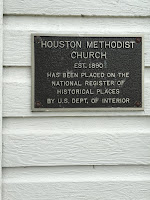 The Eighth Day by Thornton Wilder
The Eighth Day by Thornton WilderMy rating: 4 of 5 stars
I really liked this classic that was on our Book Club list for 2020. Several members did not like it at all. There are a lot of characters to keep straight and most of the time I didn't. The structure of the story was disconcerting and added another deterrent to keeping the characters straight. The story was divided into time and place segments that overlapped. The beginning seemed to be the end and the end was the beginning. That being said, there were several passages that I went back and studied. They seem to be put in place to give the reader insight in the author. I wondered how they fit into his life and the people in his world.
This read reminded me of reading 'The Great Gatsby' in high school. I learned about symbolism that writers use to convey hidden messages to the reader. I tried to figure out if Mr. Wilder used this technique. If it was there, I didn't find it. One member said she thought 'The Eighth Day' meant that God created the Earth in seven days and we were to take over and get to work on the eighth one. Another said the writer's concern with evolution that prompted the title. I never really got to that depth in meaning. It was just a story with some life and history lessons thrown into the mix. I still think it was auto-biographical.
Note: Not sure what happened to John?
If you like to read classics, I am recommending this one.
Personal Notes:
Mrs. Wickersham
page 182 "No one has ever done anything for me, spontaneously."
page 198 "You and I have a certain quality that is rare as teeth in a hen. We work. And we forget ourselves in our work. Most people think they work; they can kill themselves with their diligence. They think they are building Athens, but they're only shining their own shoes.
Roger Ashley
page 208 ..."he never ceased to search for his life's career-to explore, observe, weight , and eliminate the professions. He didn't want to waste any years on the wrong choice and he wanted to start preparing himself as soon as possible. (He was 17 1/2 -at that age I was a junior in high school. I think my English teacher had us write an essay on what we would like to do for a career. I had no idea. I wrote on being an interior decorator. I ended up being a banker, but did some interior decorating for a year or so.)












































